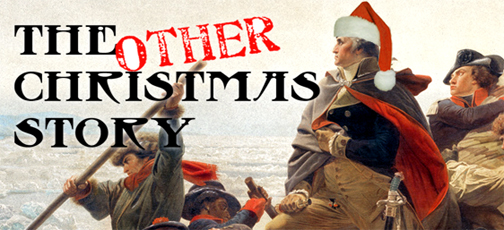| The Breed's Hill Gazette December 2008 | |
 |
|
|
It was
over. Everyone could see that the little “revolution” was a lost
cause. The only hope was that perhaps
“I wish to Heaven it was in my power to
give you a more favorable account of our situation than it is. Our
numbers, quite inadequate to the task of opposing that part of the
army under the command of General Howe, being reduced by sickness
desertion, and political deaths (on or before the first instant, and
having no assistance from the militia), were obliged to retire
before the enemy, who were perfectly well informed of our situation,
till we came to this place, where I have no idea of being able to
make a stand, as my numbers, till joined by the Philadelphia
militia, did not exceed three thousand men fit for duty. Now we may
be about five thousand to oppose Howe's whole army, that part of it
excepted which sailed under the command of Gen. Clinton. I tremble
for December 17, ten miles above the Falls.
*** I have since moved up to this place,
to be more convenient to our great and extensive defences of this
river. Hitherto, by our destruction of the boats, and vigilance in
watching the fords of the river above the falls (which are now
rather high), we have prevented them from crossing; but how long we
shall be able to do it God only knows, as they are still hovering
about the river. And if every thing else fails, will wait till the
1st of January, when there will be no other men to oppose them but
militia, none of which but those from Philadelphia, mentioned in the
first part of the letter, are yet come (although I am told some are
expected from the back counties). ---- In short, your imagination
can scarce extend to a situation more distressing than mine. Our
only dependence now is upon the speedy enlistment of a new army. If
this fails, I think the game will be pretty well up, as, from
disaffection and want of spirit and fortitude, the inhabitants,
instead of resistance, are offering submission and taking protection
from Gen. Howe in
The British were
sensible of their advantageous position. They were already looking
to march on the rebel capitol of
Somewhere between the 17th
of December, when George Washington wrote in despair to his cousin,
and the day of the 24th
he had an idea.
It was a mad, dangerous, and quite likely
impossible idea.
|
It’s hard for us to
imagine just how desperate the situation was or how wild the idea of
attack must have seemed. The artist Charles Wilson Peale described
his viewing of the army gathered on the banks of the
The attack was to have
three parts. Generals Ewing and Cadwalader would cross below
The plan began to fall
apart immediately. They arrived at the crossing point too late, the
weather bad with heavy rain, hail and freezing snow. As he left his
quarters for the crossing point,
Once
At the Birmingham
Crossroads Washington divided his troops. They would attack from
different sides, still hoping by some miracle to surprise their
enemies. About this time it was discovered that their flints and
powder had gotten wet and were probably ruined. The men asked what
was to be done; For Americans, this is the other Christmas story. It has become the subject of stories and art and reenactment. It’s so far from the way we spend our Christmas today that we can scarcely imagine what it was like, so foreign that we could easily believe it a myth. The reality of that day changed the patriot cause forever. It showed the Patriots of 76 that they could win at a time when belief was at its lowest and hope seemed foolish. It told the world that this new people, contending for liberty, just might prevail.
|